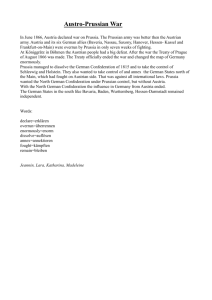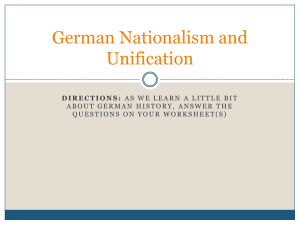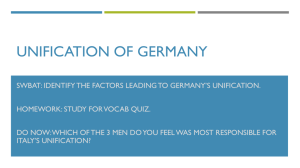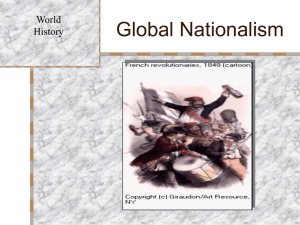German Unification
advertisement
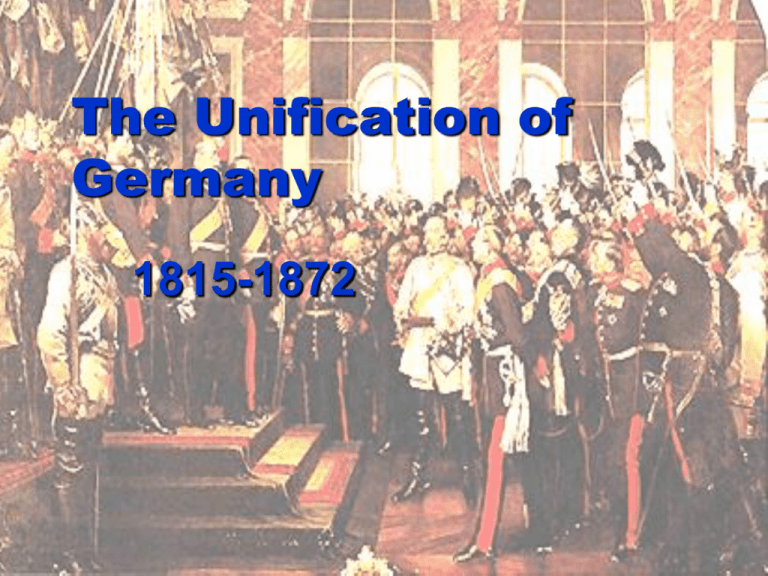
The Unification of Germany 1815-1872 National Spirit among German Speaking People before Napoleon Before the 19th Century, The German speaking people had no idea of ‘national feeling’ German speaking people occupied Central Europe, but the German states were usually very small (and the Germans there mixed with other races The upper classes look ed towards France as the cornerstone of European civilization German states during the Napoleonic Wars Napoleon’ s conquest aroused the national feeling of the German-speaking people National feeling of German speaking people continued to develop after the 1815 Although a German Confederation was created after 1815, it was not concerned with promoting a united Germany since the 39 rulers had no wish to see their independence limited by the establishment of a strong central government Austria and Russia did not want to see a strong Germany to be created The ‘Pre-March’ (Vormärz) The years 1815-48 was often called the ‘preMarch’ that means the prelude to the March 1848 Revolution in Berlin Although it was a period of illiberality and repression, nationalism and liberalism developed For example, Many students joined secret societies to campaigned for a united Germany and a ‘gymnasium’ movement was growing which instructed young men in drill, physical activities and the national spirit The ‘Pre-March’ (Vormärz) The July Revolution (1830) in Paris sparked off riots in several German states although they were eventually suppressed by Mutternich The pace of political debate picked up and public opinion grew bolder in the 1840s By the 1840s there were growing demands for a united Germany The first Movement for Unification In March 1848, Germany began to create a united Germany 600 liberals, attended a pre-parliament at Frankfurt. They decided to establish a national parliament through universal male suffrage Finally, they elected a Parliament consisted of 20 farmers, 150 traders and 611 lawyers, teachers, professors and writers In the Parliament, they drafted a constitution for the not yet unified Germany The first Movement for Unification Since the assembly came to a conclusion that only Austria but not the whole Austrian Empire could be included in the “Unified Germany”, Austria withdrew from the proposed federation The Assembly then turned to Prussia for leadership. They invited Frederick William IV to be the Emperor of Germany The first Movement for Unification Frederick refused to accept the crown. He did not want to provoke Austria, and did not want to accept the crown offered by the liberals In June 1849, as Prussia, Austria, Bavaria, Hanover, Saxony and Wurttemberg had one after the other withdrawn their representatives, the Assembly dissolved itself The rise of Prussia Prussia grew in size and population after 1815 She got part of Poland in the 18th century, and got saxony after Vienna Congress During the 19th century, reforms were carried out with in Prussia to strengthen her power The rise of Prussia In 1818, Zollverein were created. Industries and trade developed rapidly In 1834, a larger custom union was created and Prussia was the leader of the newly established union. The rise of Prussia The economic benefits were so obvious that 38 states joined the Zollverein. Only Austria was excluded Trade between German states and foreign countries became easier. It promoted German prosperity It became the first step in the political unification and industrialization. The rise of Prussia King William I became the King of Prussia in 1861 He embarked on programmes to increase the Prussian army from 500,000 to 750,000 and demanded taxation increase in the Prussian Parliament The rise of Prussia The Parliament refused the King’s demand The King ignored the Parliament and built the new army Relationship between the King and the Parliament turned worse William II then appointed Otto von Bismarck as the Prime Minister Otto von Bismarck Otto von Bismarck was an aristocrat. He was also a “Junker” (landlord). He hated parliament and democratic ideas He believed that Prussia would become strong through increasing the government’s power Otto von Bismarck In 1847, he became a member of Prussian Parliament He was a member of the Diet of the German Confederation in 1851-59 In the Diet, he openly challenged the leadership of Austria He suggested that Germany must be united by Prussian’s term Otto von Bismarck He was appointed as Prussian Ambassador in 1859 to Russia. During the period, he successfully secure the friendship between Russia and Prussia as to ensure that once Prussia was in war against Austria, Russia would not intervene Otto von Bismarck In 1862, he became the Prussian ambassador. He had an estimate of Napoleon III’s weakness during his term in France Bismarck’s Policies He determined to build a strong army He decided that Austria must be defeated and expelled from the German family so that Prussia could be the leader of German states German states should be united and formed a German Empire with Prussia as the leader Bismarck’s Policies Agrarian revolution to increase food supply and raw materials for industrialization Economic reforms included building of railways, encouragement of foreign trade, “joint-stock banks” were created to finance industries and trade Bismarck’s Policies Military reforms were also held Intensive military training raised the standard of efficiency The military budget was increased New weapons were invented In order to expand the Prussian army, Bismarck put the newspapers under censorship and dismissed all liberal elements from the government New tax was raised without the approval of the Parliament to support the expansion of the army German-Danish War(1864) Background 1. The Danes controlled Schleswig-Holstein where most of the people in Holstein were German, although the two places were not part of Kingdom of Denmark 2. In 1863 the new King of Denmark attempted to annex the two places 3. This gave Prussia a golden opportunity to realize her unification plan German-Danish War(1864) Bismarck prepared for the war: 1. Bismarck had strengthened the Prussian army since he was appointed Minister-President 2. He also won the friendship of Russia while he was the ambassador to Russia and stopped the Poles from entering into Prussia after revolts in Russia German-Danish War(1864) Bismarck also hinted Napoleon III that Prussia would support France to gain some territories in the Rhine area in return for French neutrality He also proposed a conference to settle the question When Denmark refused to attend the conference, Prussia, together with Austria, entered into the two duchies and defeated the Danes German-Danish War(1864) Convention of Gastein was signed after the war Schleswig was administered by Prussia and Holstein by Austria It would cause a lot of difficulties for Austria to rule Holstein because the duchy was between Prussia territories. This was expected by Bismarck The war also showed the leader position of Prussia within German states Austro-Prussian War (1866) The war was expected by Bismarck Before the war, Bismarck continued to maintain good relationship to Russia He also met Napoleon III and promised France to gain some land along the Rhine He had also a secret agreement with Italy for an allied attack against Austria As Britain was adopting an isolation policy at that time, Austria was completely isolated Austro-Prussian War (1866) After the completion of diplomatic arrangement, Bismarck accused Austria for supporting Augustenburg’s rule for the two duchies When Austria brought the matter before the Diet of the German Confederation, Prussia protested that the move of Austria had violated the mutual agreement Austro-Prussian War (1866) Bismarck then moved his troop into Holstein to start a war With well-trained and well-equipped army, Prussia defeated Austria and other German states who helped Austria within seven weeks North Germany states such as Hanover and Saxony fell into the hand of Prussia Austro-Prussian War (1866) A lenient treaty, Treaty of Prague, was signed According to the treaty, Prussia annexed Schleswig-Holstein and the Northern German states who supported Austria Austria had to pay a small indemnity Italy received Venetia The North German Confederation was formed Austro-Prussian War (1866) Bismarck offered a lenient treaty to Austria because he had further plan – to have a war with France. Such a treaty would prevent Austria to take revenge Southern German states were not punished because Bismarck did not want to attract attention of other European Powers Austro-Prussian War (1866) Consequences Prussia gained a lot of land. She controlled two-third of German states after the war. Her population and natural resources had greatly increased The harbour of Kiel provided an important naval base for Prussia and the future Germany Prussia became the leader of the newly founded North German Confederation Austrian leadership among the German states came to an end Austro-Prussian War (1866) Consequences Since Austria was weakened by the war, northward expansion was blocked by Prussia, Austria looked towards the Balkans. In Balkan she conflicted with the Serbs and Russia In 1867, a “Dual Monarchy” composed of two independent equal states was established. It was called AustriaHungary Franco-Prussian War (1870-71) Historians always say that the a FrancoPrussian war “would sooner or later occur” because it was part of the design by Bismarck Bismarck had prepared a war against France for a long time because he knew that France would not tolerate a strong Germany Franco-Prussian War (1870-71) The Ems telegraph In 1869, the Queen of Spain was overthrown. The throne was offered to Prince Leopard, a relative of William I Although William I asked the Prince to refuse the throne, he refused to have further assurance that his relative would never accept the crown when he met the ambassador of France in Ems Franco-Prussian War (1870-71) He then sent a telegraph to inform Bismarck the interview Bismarck omitted some words of the telegraph in a way that the French ambassador was insulted by William I, and on the other hand, the and sent the Ems telegraph to both French and German press Franco-Prussian War (1870-71) France declared war on Prussia on 14th July, 1870 After the Battle of Sedan on 1st September, Napoleon III was captured and surrendered on the next day The French abolished Napoleon III and proclaimed France a republic. They resisted the Prussian until January 1871 Franco-Prussian War (1870-71) Germans won the war. The Empire of Germany was proclaimed in the hall of Mirrors in the Palace of Versailles The Treaty of Frankfurt was signed. France had to cede Alsace and Lorraine, pay ₤200 millions reparations and had to support a German army of occupation until all reparations had been paid Franco-Prussian War (1870-71) Why Prussia won the war 1. Prussia was well prepared 2. Bismarck had successfully isolated France 3. The south German states joined Prussia in the War Franco-Prussian War (1870-71) Consequences: 1. Upsetting balance of power 2. German learnt a dangerous lesson: to use military might to acquire more land set an bad example for Kaiser William II and Hitler 3. Attempts to isolate France spilt Europe Franco-Prussian War (1870-71) Consequences: 4. Russia rebuilt her naval strength in the Black Sea and caused troubles in Balkan 5. Italian Unification completed 6. Japan was encouraged by Bismarck’s success


